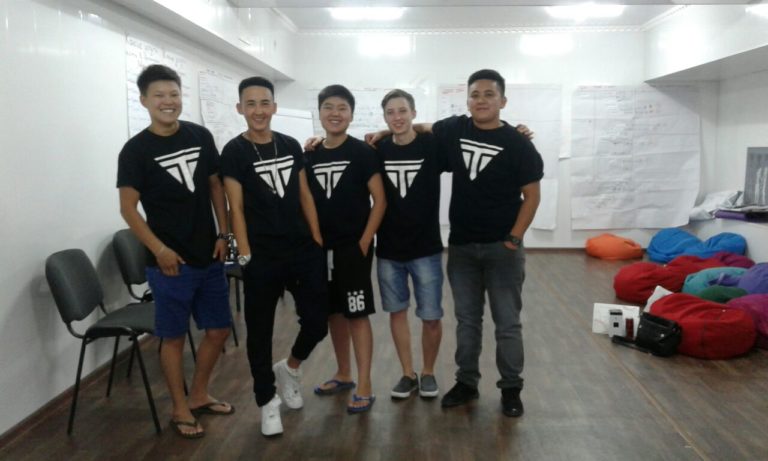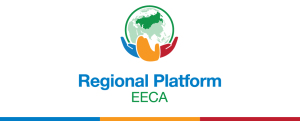By Kristina Mahnicheva
Labrys and Tais Plus, two community organizations, are working in partnership with the Eurasian Coalition on Male Health (ECOM) and the Eurasian Harm Reduction Network (EHRN) to implement the regional project “Money Can Buy Health, If you Budget For It”, funded by the Robert Carr Civil Society Networks Fund (RCNF).
The main focus of the project is to draw attention to the meaningful participation of LGBTIQ community and to build partnerships between organizations implementing similar projects and communities of people using drugs and living with HIV in Kyrgyzstan.
Meaningful participation in practice
The ultimate goal of the overall project is to ensure that the government increases funding for HIV programs in Kyrgyzstan, while strengthening partnerships with communities and NGOs. During the first phase of the project, in July and August, we organized a series of meetings with three sub-groups from the LGBTIQ community: men having sex with men, trans* people, as well as male and trans* sex workers.
The final version of the invitation
Hello. Dear [name of participant], we invite you to [time, date, place]! We are organizing meetings of expert groups from our community. What do you need to be a community expert? Only the desire of each of us to make a difference for our community for the better. At our meetings, we will discuss the community priorities in the fields of rights, nondiscrimination, and health. See you soon!
For a long time, we have been working on the message – what we are saying while inviting people to participate in the meetings:
– …Come meet with us, your opinion is important to us- we decided not to use this, as there is a separation in this sentence: we and you: we, the staff; you, the community.
– …We invite you to discuss priorities for the provision of HIV services— We also decided against this option, because issues related to HIV are often not priorities. For community members and other ordinary people, important issues include safety, having a roof over their heads, maintaining a good relationship with loved ones, and receiving a regular income.
The importance of this message lies in the rejection of the idea that the invitees are clients of the organization or program. Clients simply receive services, but working together as a community can only be done in a partnership.
Community representatives are experts on their own life and experiences. We want to move away from the often narrow conception of what it means to be an expert. We also need to take into account the real priorities of the community and recognize that HIV may not be a top priority for them.
After the first meeting, the participants of the expert group remarked that they liked the invitation and the name of the meeting, “expert group.” Many participants were encouraged by the emphasis on and the desire of others to change something in our country.
Expert Group Participants. Courtesy of Labrys.
Expert group meetings
While inviting people to participate in the expert group, we were very worried that we would not be able to find a sufficient number of people to discuss different experiences and opinions. The first series of meetings, the group of male and trans* sex workers, had the smallest number of participants with only four people. We began to think of what we should do to fix the situation. Would it be better to change the format of the meetings and hold individual or group interviews? But then, we decided that four people is in fact a group. These people found the time to come meet us, so we cannot simply say “you are four people, but we need ten, so we are going to do something else instead.”
I feel a sense of responsibility being in the expert group.
Participant of the men who have sex with men expert group
Thanks to our perseverance, we were not disappointed. We increased the number of people on our mailing lest and asked the existing participants to invite their friends. Although the number of participants at the first meeting was small, by the fourth meeting, the number had grown considerably. The meetings of the MSM and trans* groups had about 15 people each. The partners of the trans* people also joined their meeting. Meanwhile, the group of male and trans* sex workers ended up with 10 people. It is worth noting that the number of participants increased at each successive meeting. The people participating in the first meeting also attended the second and third meetings, and continued to come to each successive one.
The fundamental question: our priorities and HIV—where do they meet?
When focusing on HIV, it is very easy to overlook basic things, without understanding that it is difficult for some people to respond to the question “why do people not pay attention to their health?” When you look at a person only through the “window of HIV”, it means that you are taking away any opportunity for dialogue, meaningful involvement, or joint actions for the advancement of the community.
This is exactly why the first series of meetings was devoted to discussing the enabling environment. It was not easy to maintain a balance between the general priorities of the community and seeing their relationship to HIV programs. It often seemed that we went too far in discussing general problems, or on the other hand, were stuck only discussing HIV and services, rather than the enabling environment.
One’s mentality, as well as gender identity, can be barriers to getting test for HIV and STIs.
Participant of the trans* expert group
While discussing the enabling environment, we posed the following question: “what needs to change in our country so we do not want to leave it?” The participants of the group talked about the aggressive policies of the government towards the LGBTIQ community, discrimination from healthcare workers, police violence, the taboo nature of sex and sexual health, and about the forced disclosure of personal information related to one’s sexual orientation, gender identity or HIV status. Participants also noted the importance of the work of community NGOs to provide community members with the trust and desire to go to organizations to meet with various consultants, attend self-help groups, and to have informal venues for discussion.
Training health professionals is essential for the comfort of all members of the LGBTIQ community, however, this must be done with the involvement of community representatives.
Participant of the trans* sex workers expert group
Having analyzed the results of the first meeting, we came to the conclusion that we ourselves need to better understand the priorities of the community, in order to be able to separate the priorities of our own projects from the priorities of people not closely related with the organization.
In each of the four meetings, we paid special attention to the feelings of the participants and to how comfortable they were working in the proposed format. The participants noted several things that they were hearing about for the first time, such as pre- and post-exposure prophylaxis and tuberculosis prevention using isoniazid therapy.
Each of the three groups, men who have sex with men, trans* people, and male and trans* sex workers, tried to think of a souvenir that would remind them of their work together. One of the groups drew up this symbol.
The members of the expert groups are looking forward to the fifth general meeting, where the results of the work of each sub-group will be discussed and the priorities of the whole LGBTIQ community will be developed. This will be a big step in overcoming stigma and building solidarity within the community. This agree upon position of the community will also serve as a basis for continuing dialogue with the government.


